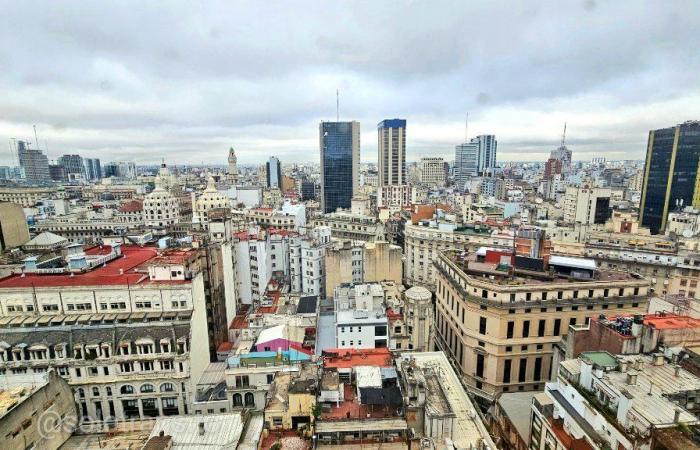
The Government of the City of Buenos Aires held a meeting with neighbors on the Zoom platform this Monday afternoon to announce that it will soon send a bill to the Buenos Aires Legislature to “adjust” several aspects of the current Urban Code.
It will be a Double Reading Law, which will be voted on twice in the parliamentary chamber and will include a Public Hearing in between in which citizens will be able to participate.
This Monday was an activity within the framework of the Permanent Participatory Forum. Many citizens participated who are part of neighborhood assemblies that reject the current code and warn of negative consequences: loss of neighborhood identity, collapse in public services, destruction of historical buildings, among other aspects.
According to a series of plates issued during the Zoom, the GCBA clarified that this is not a modification, but rather a series of “adjustments.” They cite examples of adjustments in December 2020 (which modified errata) and September 2022 (which protected the area called Lomas de Núñez and Nuevo Belgrano).
Now, the objective is to achieve an “urban balance”, promote “the protection of heritage” and incorporate the “incentive concept”, according to local authorities.
Regarding the particular criteria, the Buenos Aires Government proposes “differentiating the identity of the neighborhoods and the identity of the corridors”, seeking to “distinguish which identity prevails in each one”. They also aim to “consolidate urban development in urban subcentralities where service infrastructure, the transportation matrix and the best coverage of the needs of daily life are concentrated.”
They also address the idea of “rethinking the regulatory transitions between neighborhoods and corridors, avoiding large height jumps.” The Buenos Aires Government seeks to “promote the completion of the fabric and the formation of a homogeneous tent, avoiding gradients in the blocks.” Other points are “promote the conservation and revaluation of urban heritage” and “encourage the mixture of uses for the development of neighborhood estate subcentralities.
On the other hand, the GCBA proposes to incorporate 4,209 properties in the Preventive Catalog, to avoid their demolition. This is a temporary measure awaiting a definitive Buenos Aires Law.
Regarding the incentive system, “sustainable urban development is proposed where the protection of urban heritage and the development of the south is promoted through the consolidation of receiving areas where infrastructure and services are concentrated.”
According to the GCBA, this adjustment began to be worked on together with representatives of entities in the sector: Professional Council of Architecture and Urbanism (CPAU), Professional Council of Civil Engineering (CPIC), Business Chamber of Urban Developments (CEDU), the Real Estate Professional College (CUCICBA), among others.
In a communication, the Right to the City Observatory made several points about the presentation. First, he warned that the Buenos Aires officials “recognized that they did not comply with the General, Particular and Instrument Monitoring stage from which the information necessary for the diagnosis should arise for the comprehensive evaluation of the Urban Code. “They called the meeting without any report or opinion or conclusion of the monitoring stage.”
“During the meeting they reported the proposed “adjustment” of the Urban Code in less than 10 power point images. Without further explanation and they did not give us access to the bill or its draft or to any more detailed report,” they added.
“There will be no other instance of institutionalized participation except the public hearing in the Buenos Aires Legislature once they have approved the bill in first reading. Therefore, they once again violate the system of citizen participation established in art. 1.1.4 and art. 10.11 of the Urban Code, the Urban Environmental Plan and the Escazú Agreement,” indicated the ODC.
“They recognized that this modification is not going to address anything related to the collapse of public services. A notable absence in the current Urban Planning Code that should have contemplated it in accordance with the provisions of the Urban Environmental Plan. This illegal omission is repeated again. They recognized that the regulation of public space will not be discussed either. This Urban Code will continue to be a Code for private construction without considering the entirety of the city. Once again they are going to discuss the modification of the Urban Code without previously approving the update of the Urban Environmental Plan, the Environmental Code and the Territorial Model,” were other criticisms of the civil entity.
“They report that they are going to incorporate more than 4,000 thousand properties that are in the Preventive Asset Catalog to the Definitive Catalog. But they do not report what will happen to the thousands of properties that are out of the catalog because they have not yet been evaluated in accordance with the provisions of the Urban Environmental Plan and the recent court ruling that we achieved,” they added.
“In conclusion, we witnessed a falsified or troubling citizen participation to formally validate the treatment of a bill to which we could not access. We participate in a democratic fraud to legitimize the large real estate deals that this administration has planned in the shadows for the city,” concluded the ODC.

